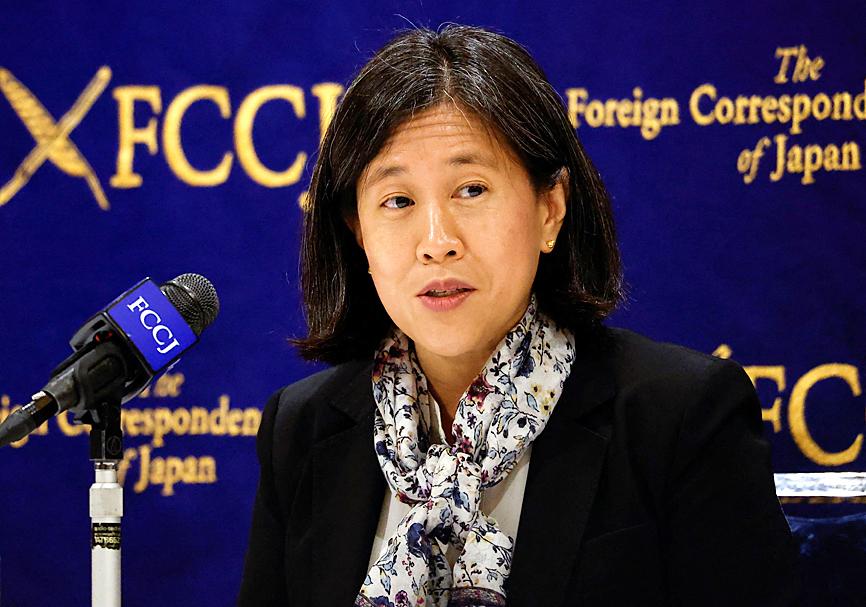Washington is not seeking to decouple the US economy from China’s, US Trade Representative Katherine Tai (戴琪) said yesterday while on a visit to Tokyo.
Tai, who is on her fourth visit to Japan after being appointed the top US trade envoy, said all members of US President Joe Biden’s administration have been “very clear that it is not the intention to decouple” from China’s economy.
US trade sanctions against China are “narrowly targeted,” she said.

Photo: Reuters
Given its huge size and importance, unraveling the ties with China that keep the world economy running is “not a goal or achievable,” Tai said in a news conference at the Foreign Correspondents’ Club of Japan.
Chinese officials have often lashed out at the US over trade sanctions and other restrictions on sharing of advanced technology with China, accusing Washington of trying to “contain” China and hinder its path toward greater affluence.
Tai said that regular trade work between the US and China was continuing and she was “completely open to engaging with my counterparts in Beijing,” although she has no immediate plans to visit China.
At the same time, the US is seeking to strengthen and expand economic security cooperation with its Asian allies and partners in response to China’s growing assertiveness and its dominance in many manufacturing industries.
Security and stability of supply chains is an issue that has gained urgency after disruptions caused by the pandemic and controls imposed to try to fight outbreaks of COVID-19 resulted in shortages of computer chips and other goods.
A recent agreement on trade in critical minerals would allow electric vehicles using metals sourced or processed in Japan to qualify for tax breaks under the US’ Inflation Reduction Act.
That deal is one evidence of the US commitment to “building collective resilience and security,” Tai said.
“We have all experienced the fragility of our dispersed supply chains in recent years, especially through the pandemic and Russia’s brutal, unjustified attack on Ukraine. And we’ve become too reliant, we have discovered, on certain countries for the supply of critical minerals needed to fuel our clean energy future,” Tai said.
The Biden administration has been adopting a new approach to global trade, arguing that the US’ traditional reliance on promoting free-trade pacts failed to anticipate China’s brand of capitalism and the possibility that a major power like Russia would go to war against one of its trading partners.
Tai’s Tokyo visit follows a trip to the Philippine capital, Manila, to help fortify trade relations among the three countries as they build both economic and defense ties.

NO LIVERPOOL TRIP: Taiwan’s Lin Yu-ting, who won a gold medal in the boxing at the Paris Olympics, was embroiled in controversy about her gender at that event Taiwanese boxer Lin Yu-ting (林郁婷) will not attend this year’s World Boxing Championships in Liverpool, England, due to a lack of response regarding her sex tests from the organizer, World Boxing. The national boxing association on Monday said that it had submitted all required tests to World Boxing, but had not received a response as of Monday, the departure day for the championships. It said the decision for Lin to skip the championships was made to protect its athletes, ensuring they would not travel to the UK without a guarantee of participation. Lin, who won a gold medal in the women’s 57kg boxing

RESPONSE: The transit sends a message that China’s alignment with other countries would not deter the West from defending freedom of navigation, an academic said Canadian frigate the Ville de Quebec and Australian guided-missile destroyer the Brisbane transited the Taiwan Strait yesterday morning, the first time the two nations have conducted a joint freedom of navigation operation. The Canadian and Australian militaries did not immediately respond to requests for comment. The Ministry of National Defense declined to confirm the passage, saying only that Taiwan’s armed forces had deployed surveillance and reconnaissance assets, along with warships and combat aircraft, to safeguard security across the Strait. The two vessels were observed transiting northward along the eastern side of the Taiwan Strait’s median line, with Japan being their most likely destination,

‘NOT ALONE’: A Taiwan Strait war would disrupt global trade routes, and could spark a worldwide crisis, so a powerful US presence is needed as a deterrence, a US senator said US Senator Deb Fischer on Thursday urged her colleagues in the US Congress to deepen Washington’s cooperation with Taiwan and other Indo-Pacific partners to contain the global security threat from China. Fischer and other lawmakers recently returned from an official trip to the Indo-Pacific region, where they toured US military bases in Hawaii and Guam, and visited leaders, including President William Lai (賴清德). The trip underscored the reality that the world is undergoing turmoil, and maintaining a free and open Indo-Pacific region is crucial to the security interests of the US and its partners, she said. Her visit to Taiwan demonstrated ways the

The US has revoked Taiwan Semiconductor Manufacturing Co’s (TSMC, 台積電) authorization to freely ship essential gear to its main Chinese chipmaking base, potentially curtailing its production capabilities at that older-generation facility. American officials recently informed TSMC of their decision to end the Taiwanese chipmaker’s so-called validated end user (VEU) status for its Nanjing site. The action mirrors steps the US took to revoke VEU designations for China facilities owned by Samsung Electronics Co and SK Hynix Inc. The waivers are set to expire in about four months. “TSMC has received notification from the US Government that our VEU authorization for TSMC Nanjing